Stiff stomach does not leave gases. How to get rid of gases in the intestines and why they occur.
Why don't gases come out?
Every person sooner or later faces the problem of digestion - bloating and the formation of gases and colic. Usually, some of the gases accumulate in the large intestine, and they are released during a bowel movement. For some people, the amount of gases is too large and they begin to bother throughout the day.
We are embarrassed to go to the doctor with this and do not attempt a cure. But such malfunctions in our body can indicate serious diseases. One of the main reasons is not proper nutrition. You can not eat on the go and on the street. Only those foods that do not cause gas formation and are compatible with each other should be present in the diet.
Another reason for not passing gases is stressful situations. Muscles begin to tighten and contract incorrectly. This leads to the urge to go to the toilet and gas formation.
With the proper functioning of the digestive system, up to 0.5 liters of gas is excreted during the day. When gases accumulate in the intestines, this volume can be tripled. Intestinal gases are composed of methane, hydrogen, carbon dioxide, nitrogen, and oxygen. With flatulence, an unpleasant odor is produced in the large intestine by bacteria.
Symptoms of increased gas content in the intestines are:
- cramping pain and discomfort;
- bloating;
- rumbling;
- belching;
- diarrhea or constipation;
- a sharp release of gas with a characteristic odor;
- palpitations and arrhythmia;
- insomnia and mood swings;
- general malaise.
Gas in the stomach does not come out
Aerophagia leads to the accumulation of gases in the abdomen. A person swallows air when inhaling, chewing chewing gum, while smoking, with hysterical behavior, increased salivation and with irritable bowel syndrome.
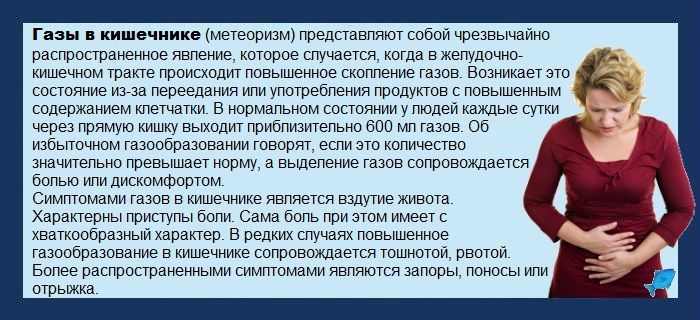
Puffy gases do not come out
This condition also leads to the use of food:
- sweet carbonated drinks;
- vegetables: radish, cabbage, pumpkin, asparagus;
- dairy products with lactose;
- fruit juices and fruits containing sorbitol and fructose;
- foods, starch content: bread and potatoes;
- vegetables with pectin: blackcurrant, apricots, quince.
During pregnancy, excess gas in the abdomen is a common occurrence. This is due to the relaxation of the intestinal muscles as a result of exposure to progesterone. The pressure of the uterus on neighboring organs, including the intestines, increases.
Stomach hurts no gases coming out
During the accumulation of gases, a person experiences severe pain in the form of colic and spasm. The pain can appear in periods, then let go, then intensify. An increase in body temperature up to 38 ° C may be observed. The person feels weak, he has a cold sweat. Often in such cases, the doctor suspects peritonitis or pancreatitis. You can not take painkillers before his arrival, as this will not show the true picture of the disease.
What to do if gases do not come out?
An ambulance for gas accumulation is a gas outlet tube. You can use herbal preparations: dill water, fennel, cumin tincture.
For two weeks, you need to stop eating milk. Eat more fiber foods and add ground wheat bran to meals.
Do not pass on and avoid carbonated and alcoholic drinks. Try replacing coffee with tea, and meat dishes with fish. After eating, it is useful to walk a little so that the intestines work more actively.
If the cause is a disease, then it must be treated. The doctor may prescribe biliary herbal preparations. Fennel helps a lot. In India, to improve the process of digestion and discharge of gases after eating, it is first chewed well, and then swallowed. Cumin and anise seeds are also used for this.
If the cause is stress, then drink sedatives. This is valerian, motherwort, soothing herbal collection.
If flatulence appeared due to chronic pancreatitis, then you need to undergo a medical examination. Then, semiticone derivatives are prescribed as a drug treatment. These are Mezim, Pancreatin, Creon, Smecta.
The accumulation of gases against the background of gastritis, peptic ulcer, dysbacteriosis and enterocolitis is the treatment of the underlying disease. To do this, an ultrasound examination of the abdominal organs, computed tomography and radiography, colonoscopy and gastroscopy are performed. Take feces for analysis for occult blood.
If flatulence is accompanied by weight loss, heartburn, difficulty breathing, stomach pain, then this also requires serious treatment.
Every Tuesday, AiF Health explains what signs might indicate that you need to see a doctor. This week we will tell you what flatulence is and how increased gas formation is treated.
This phenomenon is called flatulence. Flatulence - excessive accumulation of gas in the gastrointestinal tract due to its increased formation or impaired excretion - refers to common syndromes of internal diseases.
It significantly complicates our life, but despite this, many patients, being "embarrassed" about their condition, do not go to the doctor.How many are there?
There are three main sources of gas in the intestines: swallowed air, gases formed in the lumen of the colon, and gases from the blood. The gastrointestinal tract contains on average about 200 ml of gas. In healthy people, about 600 ml of gases are released daily through the rectum. The unpleasant smell of these gases is associated with the presence of such compounds as indole, skatole, hydrogen sulfide, they are formed in the large intestine as a result of the action of microflora on organic compounds undigested in the small intestine. The gases accumulating in the intestines are a mucous foam that covers the surface of the intestinal mucosa with a thin layer. This, in turn, complicates parietal digestion, reduces the activity of enzymes and disrupts the absorption of nutrients.
What is the reason?
Flatulence is observed in practically healthy people when overeating or eating foods, the digestion of which causes increased gas formation.
As a result of flatulence, extraintestinal symptoms may appear: burning in the region of the heart, heart rhythm disturbance, mood disorder, sleep disturbance, general weakness.
Another reason for the accumulation of gases in the small intestine can be the result of several medical and genetic problems, such as celiac disease (gluten intolerance) or inflamed intestines. In these cases, anatomical abnormalities occur in the intestinal wall, which cause a slowdown in the digestive process and the absorption of gases.
Sometimes “stress flatulence”, that is, excessive “talkativeness” of the intestines, is provoked by nervous situations that “awaken” stress hormones. Some experts even refer to irritable bowel syndrome as "gut depression." Interestingly, there is a similar hormonal imbalance in clinical depression and "gut depression".
What to do?
The treatment of flatulence is based on several principles. The first is to eliminate the cause of increased gas formation. To do this, it is necessary to correct the diet and cure the existing diseases of the upper digestive tract: the esophagus, stomach, bile ducts and pancreas. Diseases such as gastroparesis (delayed emptying of the stomach) and chronic pancreatitis are treated with certain drugs or dietary supplements containing enzymes. To diagnose these ailments, you need to undergo a colonoscopy or gastroscopy.
"Hazardous" products include: sauerkraut, onions, tomatoes, apples, pears, watermelons, mushrooms, peas, milk, carbonated drinks, products that cause fermentation processes (lamb meat, black bread, raisins), as well as kvass and beer (in which fermentation occurs independently as a result of enzymatic processes ).The organization of rational nutrition implies the exclusion of foods containing coarse fiber (cabbage, sorrel, grapes, gooseberries). Legumes and products that cause fermentation reactions (kvass, beer, carbonated water) are also excluded. Sour-milk food, crumbly cereals (buckwheat, millet), boiled vegetables and fruits (carrots, beets), boiled meat only, wholemeal wheat bread with bran are recommended. It is not recommended to drink coffee and chocolate, you will have to give up exotic fruits. Eat little and often, avoid overeating. It is also worth taking into account that during a lively conversation at the table with food, air is swallowed.
Another principle of treatment is the removal of accumulated gases from the intestines. For this, means are used, among which there are those known to our grandmothers: infusions of dill, fennel, cumin. You can also use absorbents that partially absorb excess gases. However, the action of these drugs occurs after a significant period of time after ingestion, and together with gases they can “grab” beneficial microorganisms, minerals and vitamins.
Since one of the causes of increased gas formation is a violation of the intestinal microflora, the treatment of dysbacteriosis is no less important.
So, if you have flatulence, go to the doctor and strictly follow all his instructions. Some procedures are not very aesthetic and pleasant, but they are so short-term and effective that you will soon remember your “embarrassing” state with a smile.
Last Tuesday AiF Health told,
It is impossible to find a person who would not experience the discomfort associated with the processes of increased gas formation in the stomach. Bloating and heaviness cause uncomfortable sensations, and inappropriate rumbling or put a person in an awkward position in front of others. It is not possible to contain these processes inside, but it is possible to prevent their appearance or accelerate the process of suppression.
Content:
Causes of increased gas formation in the stomach
Causes of flatulence include:
- incorrect or illegible;
- features of the body;
- various diseases;
- medications.
Let's dwell on each in more detail.
This reason is the most common and commonplace. Mechanical factors contribute to the excessive formation of gastric gases. These are overeating, talking and drinking during meals, rushing and swallowing poorly chewed pieces of food.
This phenomenon can cause the use or abuse of products that are slowly or not 100% processed. An example is fatty foods. In the process of its long digestion, bacteria manage to excrete a large amount of waste.
It has been proven that the use of certain foods is accompanied by the ingestion of a significant amount of air. These include chewing gums and hard lozenges. Carbonated drinks play a negative role. The reason is obvious - they contain a large amount of dissolved carbon dioxide.
Body features:
Many people suffer from this phenomenon due to lactose intolerance contained in dairy products. A similar situation can be with fructose and starchy foods (corn and potatoes).
Diseases:
Flatulence can be a manifestation of various ailments. Deviations in the work of the gastrointestinal tract can be accompanied not only by spasms, vomiting and diarrhea, but also by a sharp increase in the volume of gastric gases released. Such diseases are:
- ulcerative colitis
- enteritis
- irritable bowel syndrome
- chronic
- Crohn's disease
Flatulence can also accompany such ailments as:
- heart failure
- neuroses
- dysfunction of the pancreas
- cirrhosis of the liver
Medications:
The connection of some medicines and the process of gas formation in the stomach is explained by a possible violation of the bacterial environment and process.
A common option is various antibiotics. For them, the fight against bacteria is the main goal. But both harmful and useful representatives suffer from this.
A negative impact, in terms of the development of flatulence, is provided by drugs that block the absorption of carbohydrates. These funds are widely used in the fight against type 2 diabetes.
Determining the cause of increased gas formation is the most important step in the process of treating this problem.
Methods of dealing with flatulence
If unwanted gastric gases are not a manifestation of any disease or food intolerance, then the methods that prevent their formation are quite simple. Among them are the following:
- measured meal
- lack of large sips when drinking
- chewing food thoroughly (this will increase the palatability of the latter)
- avoiding overeating and talking during meals
- the right choice of ingredients
- regular physical activity
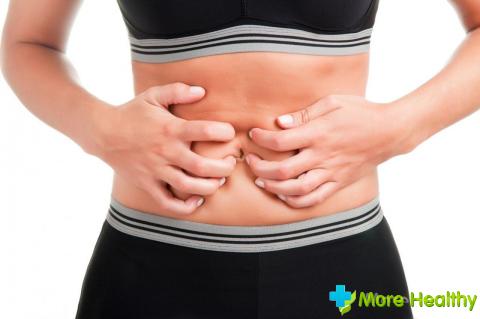
Products that promote increased gas formation include:
- vegetables (cabbage of any variety, radish)
- root vegetables (pumpkin, potatoes)
- flour and sweets (fresh pastries, sugar substitutes, confectionery)
- berries (grapes, raspberries, gooseberries)
- legumes (peas, beans, soybeans)
- dried fruits and fruits (raisins, dates, dried apricots, bananas, pears, apples)
- carbonated drinks (including alcohol)
- fruit juices
Among the ready-made delicacies that cause the effect in question, one can single out fried potatoes, fresh vegetable dishes, Stolichny salad (or, in a popular way, Olivier), fried meat and fish dishes.
Instead of the above products, enrich the diet should be:
- water with a little lemon juice
- nuts
- soft cheeses
- rice flour-based pastry with minimal added sugar
- turmeric
- vegetable soups
- cereals (corn, buckwheat, oatmeal)
- natural yogurt
- apricots and pomegranates
- teas from mint, chamomile, thyme (both brewing the ingredients separately and combining them)
- fresh tomatoes, beets, carrots, spinach
- eggs prepared according to various recipes
- meat and fish dishes baked in the oven or cooked in a double boiler

The information provided is valuable for preventing gas formation in the stomach. If the phenomenon is already observed, then other assistance is needed. A few tricks for rumbling in the stomach:
- press down with your hands on the area in the area of \u200b\u200bthe stomach, slowly release
- rest against the table with your stomach, pressing it moderately
- drink some water
- draw in the stomach due to the muscles
- artificially induce belching
Given the individuality of the human body, it is impossible to offer universal options for combating the formation of gases in the stomach or the manifestation of such a phenomenon. The choice of a suitable method is carried out by trial method.
Treatment of gases in the stomach with medicines and folk recipes
In the fight against the phenomenon under consideration, drug treatment shows high efficiency. This approach requires the advice of a qualified specialist, especially when it comes to children. Before using medicines, you should carefully study the leaflet (instruction).
The most popular medicines are:
- Mezim forte: The drug is available in the form of tablets. It is not contraindicated for children, but it is worth giving this group of patients only after consulting a doctor. The dosage is prescribed depending on the severity of flatulence. Mezim forte is contraindicated in persons suffering from pancreatitis.
- Motilium: The agent is presented in the form of a suspension or resorbable tablets. The first of the above forms of release is assigned to children. The possibility of combination with other drugs should be agreed with a specialist. Dosage is based on age. Contraindications are represented by diseases and gastrointestinal bleeding.
- Meteospasmil: The drug is available in the form of capsules. Use by children under 14 years of age is prohibited.

- Motilak: Release form - resorbable tablets. Children under 5 years of age are contraindicated. It is forbidden to use the drug and groups of patients suffering from intestinal obstruction and bleeding in the gastrointestinal tract.
Traditional medicine offers options for the treatment and prevention of almost all existing ailments. Flatulence is no exception. Connoisseurs of folk secrets offer the following options for dealing with gastric:
- Take 1 tablespoon of dill oil per liter of water, mix. Use a tablespoon every 5 hours during the day.
- Dry the dill, pass it through a coffee grinder, use as a seasoning.
- Pour 30 grams of elecampane with boiling water in a volume of 1 liter, leave for 1 hour, strain. Use 100-130 ml three times a day.
- Pour 200 ml of boiling water over lemon balm leaves. The latter will be enough 4 tablespoons. Simmer for 20 minutes in a water bath. The decoction is taken three times a day for a tablespoon.
The choice of a way to combat flatulence is advisable to carry out on the principle of less harm to the body. First, you should try to normalize your diet and lifestyle. If there is no desired effect, go to the recipes offered folk medicine. And only after that the choice of suitable medicines is carried out.
While watching the video, you will learn about gases in the intestines.
By itself, it is not a disease, and it is extremely rarely treated in a hospital. But if it causes concern for a long period, medical consultation is highly recommended.
Living with gas in the digestive tract
has prepared a series of pamphlets with advice for patients regarding digestive problems. This brochure is about gases in the digestive tract.The main thing about gases
- the passage of gases through the gastrointestinal tract is natural in the normal functioning of the body, it often helps to feel relief
- some people feel the presence of excess gas, which can make them feel uncomfortable
- gases in the gastrointestinal tract appear when swallowing air and when digesting food eaten
- You can control the situation with gases with the help of diet.
Gases in the gastrointestinal tract
Gas in the digestive tract is not a subject that most people would like to discuss. The truth is that everyone has gases and that everyone should get rid of them. The release of gases through the rectum or in the form of belching through the mouth is normal. Both that, and another - processes necessary for an organism which allow to remove gases.If gases do not pass easily, they can collect in some part of the gastrointestinal tract, causing bloating and discomfort. Even normal levels of gas in the body can disturb people who are sensitive to it. Even though gas is not usually a symptom of a disease, in some cases it can be. So if you have persistent or excessive flatulence (flatulence), discuss this with your doctor.
How much gas does the body produce?
The amount of gas the body produces varies. Most people produce between a pint and a half gallon (very roughly 0.5 to 2 liters) of gas per day. Most of the gases are oxygen, carbon dioxide and nitrogen from the swallowed air. When food is digested, the colon produces hydrogen and methane, as well as carbon dioxide and oxygen. All these gas components are odorless. Small amounts of hydrogen sulfide, indole, and skatole, which form when food is digested in the colon, give off an unpleasant odor to some gases.
Where does gas and belching come from?
A common source of gases in the upper gastrointestinal tract is swallowed air. Every time we swallow, a small amount of air enters the stomach. This gas from the stomach tends to pass into the small intestine, where some of it is absorbed. The rest of the gas passes into the large intestine and exits through the anus.
In some people, part of the gas does not pass from the stomach into the intestines, but comes out in the form of belching. The reason for this may be:
- consumption of soft drinks containing carbon dioxide, which, when heated in the stomach, can release large amounts of gases
- swallowing large volumes of air during stress
- frequent swallowing of air by some people due to chewing gum, smoking, or nasal drops
- rushed meals or ill-fitting dentures can also cause you to swallow too much air
- carbonated drinks, which increase gas production in the digestive tract. If you have problems with gas, carbonated or "sparkling" drinks should be avoided.
 |
| The human digestive system. 1 - esophagus, 2 - liver, 3 - duodenum, 4 - stomach, 5 - jejunum and ileum (sections of the small intestine), 6 - caecum, 7 - colon, 8 - appendix, 9 - rectum, 10 - anus |
Repetitive belching
Some people experience frequent burps. This can occur after a person swallows air without realizing it. Sometimes belching is accompanied by the movement of the contents of the stomach back (reflux) into the esophagus. To clear the esophagus of reflux, a person may involuntarily swallow more frequently, which leads to more air swallowing and repeated burping.
Another cause of repeated belching is gastritis (inflammation of the stomach lining). There are many causes of acute or chronic gastritis, but the most common cause is infection by a bacterium. Helicobacter pylori. When this bacterium enters the stomach, it can produce bloating. Its presence can be established by a gastroenterologist. A doctor can detect infection by examining breath, stool, or blood. The doctor may also take a sample of tissue (biopsy) from the stomach using a flexible tube called an endoscope inserted through the mouth. Helicobacter pylori infection is usually treated with antibiotics.
Is excess gas a sign of disease?
If excess gas is your only symptom, it probably isn't a sign of a disease. The problem may arise simply because you are swallowing air or not digesting food completely. It is possible that there are bacteria in your intestines that produce a lot of gas. You may have a sluggish bowel that does not expel air easily. It is possible that you have an irritable bowel or a spastic colon, which means that you cannot tolerate the accumulation of gas inside the intestines, so that even a small amount of gas feels uncomfortable.
Food and gases
The foods that we consume can be a factor in the appearance of gases in the lower intestines. Some foods are not completely absorbed in the small intestine, they contain carbohydrates that are poorly absorbed by it, but when they reach the large intestine, they are fermented by bacteria that live in the large intestine, resulting in the formation of gases. These products include: cabbage, cauliflower and Brussels sprouts, broccoli, dried beans, bran.Cellulose
Many people today are trying to improve their nutrition and health by eating more fiber (plant fibers). However, some people find that adding a lot of fiber to their diet causes excessive gas. This can happen when you start eating more whole grains, such as whole bran, oatmeal or oat bran, more whole grains, bread, or more fresh fruits and vegetables. They experience gas when they switch to a high-fiber diet, but within three weeks or so, they can adapt to it. Some people, however, don't adapt, and bloating from high-fiber foods can be a constant problem.
Milk and dairy products
If there is a suspicion that excessive gas is caused by lactase deficiency, the doctor may suggest that you stop consuming dairy products for a while to make sure that they are causing gas. A doctor may also order a breath test to determine lactose intolerance, which detects the hydrogen released by bacteria in the large intestine during the fermentation of undigested lactose in the small intestine. If milk is found to be causing gas, you may want to consider drinking milk in which the lactose has already been broken down and thus can be absorbed by the small intestine.
Fruits and sweets
 Finally, eating a lot of foods that contain fructose, which is commonly found in fruits and high-fructose processed foods like corn syrup, can also contribute to gas. The small intestine can only absorb a limited amount of fructose per day. Like undigested lactose, it passes into the large intestine, where it is fermented by bacteria. Artificial sweeteners such as sorbitol, found in diet foods, are also poorly absorbed in the small intestine and are a source of excessive gas.
Finally, eating a lot of foods that contain fructose, which is commonly found in fruits and high-fructose processed foods like corn syrup, can also contribute to gas. The small intestine can only absorb a limited amount of fructose per day. Like undigested lactose, it passes into the large intestine, where it is fermented by bacteria. Artificial sweeteners such as sorbitol, found in diet foods, are also poorly absorbed in the small intestine and are a source of excessive gas. Abdominal pain and swelling
A large amount of fatty foods in the diet can lead to bloating and discomfort in the abdomen, fatty foods linger in the stomach during digestion, increasing the amount of gas in it. This problem can be avoided by eating less fatty foods.
The feeling of swelling in the abdomen may increase during the day and becomes most severe after a large meal. Many people think bloating after eating is caused by a lot of gas. Researchers, however, found no relationship between this symptom and total abdominal gas. For some people, even a small amount (1 ounce per half pint) of gas in the intestines can cause spasms, especially after eating.
Gas in the upper abdomen, often belching. Sometimes people try to swallow air in order to burp later. However, this does not help, as such a sip only adds to the volume of gas in the stomach and does not reduce discomfort.
Gas can be collected anywhere in the lower intestines. Often it collects in the left part of the colon and causes pain that can be confused with pain coming from the heart. When gas collects in the right side of the colon, the pain can be similar to that of gallbladder disease or even appendicitis.
Feeling bloated is probably not a concern for everyone, but it can be a sign of a more serious problem, such as an intestinal blockage. If the problem is chronic, or if you experience a sudden increase in gas, you should talk to your doctor.
How to reduce the amount of gas in the digestive tract?
If you are concerned about excessive burping or gas and your doctor determines that you do not have a serious illness, the following tips may be helpful:- visit your dentist to make sure your dentures fit properly
- avoid chewing gum or sucking on hard candies (especially chewing gum with a sweetener or diet candies containing sorbitol)
- Eliminate carbonated drinks from your diet and cut back on high-fructose foods such as corn syrup
- if you are lactose intolerant, avoid milk and dairy products such as soft cheeses, or try drinking milk that has already broken down the lactose
- Eat less gas-producing foods such as cabbage, cauliflower, Brussels sprouts, broccoli, bran, and beans alternatively, when consuming these foods, you can take advantage of over-the-counter gas-neutralizing medications that can help break down the non-absorbable carbohydrates found in these foods
- walking, running, gymnastics and other exercises help to stimulate the passage of gas through the digestive tract.
Can over-the-counter medications reduce gas?
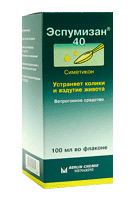 Many gas problems can be solved with over-the-counter medications. It is often believed that these drugs do not help much, but they do help some patients.
Many gas problems can be solved with over-the-counter medications. It is often believed that these drugs do not help much, but they do help some patients. - simethicone and digestive enzymes such as lactose are among the most recommended by doctors. For patients with lactase deficiency, milk with lactase may be offered.
- sometimes doctors prescribe drugs that stimulate gastrointestinal motility (prokinetics), which help move gas through the intestines and in some cases can solve the problem with gases
- Medications and dietary supplements that contain enzymes (eg, α-galactosidases) that break down nonabsorbable carbohydrates found in beans and some vegetables may be helpful.
Illustrations added during translation. We also recommend articles:
Gases in the intestines are a normal physiological process in the body of any person. Increased gas formation (flatulence) is not a sign of any serious pathology in the body, but requires treatment, as it causes severe discomfort and indicates the first disturbances in the digestive organs (esophagus, stomach, intestines).
Flatulence is a widespread phenomenon in which an excess of gases accumulates in the intestines. This can be felt by an absolutely healthy person when overeating, eating foods rich in plant fiber. Excess accumulations of gases in the intestines are obtained as a result of a violation of the ratio between the formation and removal of gases. They enter the intestines from the air swallowed by a person into the stomach, gas released from the bloodstream and from the caecum.
 Normally, the release of gases occurs in humans up to 25 times a day. They are odorless. An unpleasant odor is a consequence of compounds such as indole, skatole, hydrogen sulfide. They are decay products during the interaction of intestinal microorganisms with undigested food residues that enter the large intestine from the small intestine.
Normally, the release of gases occurs in humans up to 25 times a day. They are odorless. An unpleasant odor is a consequence of compounds such as indole, skatole, hydrogen sulfide. They are decay products during the interaction of intestinal microorganisms with undigested food residues that enter the large intestine from the small intestine.
Gases in the intestine are multiple small bubbles covered with viscous mucus. Their content in large quantities complicates digestion, absorption of nutrients and reduces the activity of enzymes.
The reasons
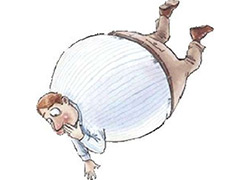 In medicine, several types of increased gas formation in the intestines are distinguished, each of which has its own reasons:
In medicine, several types of increased gas formation in the intestines are distinguished, each of which has its own reasons:
- alimentary - physiological causes associated with the ingestion of the stomach, along with food, a large amount of air, as well as the use of foods excessively rich in fiber;
- digestive - increased accumulation of gases in the intestine occurs against the background of an insufficient level of enzymes. In rare cases, the process can proceed as a result of a violation of the circulation of bile;
- dyspiotic - flatulence occurs due to a violation of the normal ratio of beneficial and pathogenic microflora in the intestine;
- mechanical - with malignant or benign neoplasms, they make the intestinal lumen narrower, causing problems with normal gas exchange;
- dynamic - in case of serious pathologies (peritonitis, intoxication of the body with feces in acute obstruction, with abnormalities in the development of the intestine), the formation and removal of gas from the intestine is difficult and slows down;
- circulatory - flatulence manifests itself against the background of improper functioning of the circulatory system.
The causes of gases in the intestines are also more commonplace, among them:
- smoking - along with tobacco smoke, a smoker at the level of reflexes draws in a large amount of air;
- poor chewing of food;
- drinking large amounts of highly carbonated drinks;
- surgical interventions;
- stressful situations;
- taking strong antibiotics.
Symptoms
 The most common symptoms of increased gas production that cause discomfort include:
The most common symptoms of increased gas production that cause discomfort include:
- a feeling of fullness in the intestines, bloating;
- in rare cases, mild pain of a single or permanent nature is possible, occurring in the stomach and esophagus, mainly after eating;
- acute pain - a strong accumulation of gases in the intestine, stretches its walls, a reflex spasm is formed and, as a result, pain;
- rumbling in the abdomen - occurs when a large amount of gas is mixed with the liquid part of the contents of the intestine;
- frequent belching - occurs due to dysphagia (a disorder of the act of swallowing, in which a person swallows a large amount of air) and the reverse flow of gas from the stomach. Belching is a natural physiological process. But if it is accompanied by an unpleasant odor and pain, this may indicate some disorders in the digestive system;
- constipation or diarrhea - violations of the act of defecation are always accompanied by increased gas formation;
- nausea is a rare and not entirely characteristic symptom that may indicate digestive disorders and, as a result, the content in the large intestine of a large amount of toxins and the remaining particles of undigested food;
- feeling of discomfort after eating: heaviness;
- splenic flexure syndrome - flatulence occurs due to the rare anatomical structure of the intestine. The left flexure of the colon is located high under the diaphragm and is an obstacle to the free passage of gases. The syndrome is dangerous for its symptoms, which are often confused with the manifestation of heart failure, since this structure of the intestine causes severe pressure and pain in the chest area.
- flatulation - gases leaving through the rectum have a strong, unpleasant odor. Normally, such episodes occur 15 to 20 times a day.
Symptoms of gas in the intestines can appear constantly or intermittently after eating certain foods. It is characteristic that discomfort and discomfort disappear after the discharge of gases or the act of defecation.
Signs of flatulence more often and brighter manifest themselves in the afternoon, when all systems and organs are working at full strength. Given that the symptoms of flatulence are not specific, depend on many factors and are very often combined with more serious intestinal pathologies, further treatment depends on the characteristics of the person's diet and a thorough examination.
Diagnostics
When the patient complains of severe discomfort and frequent pain, the gastroenterologist conducts a general examination to exclude possible existing pathologies or abnormalities in the work of the stomach, esophagus and intestines, as well as to determine the causes of flatulence. The following diagnostic methods are used:
- coprogram - taking feces for analysis, which allows you to detect a lack of enzymes responsible for the digestive process;
- analysis of feces for dysbacteriosis - to identify possible disorders in the intestinal microflora.
- x-ray of the intestine - to identify possible pathologies in the form of mechanical obstacles that prevent the movement of food, feces and gases in the intestine.
- colonoscopy - is prescribed to examine the colon and identify pathologies of varying degrees.
Features of treatment
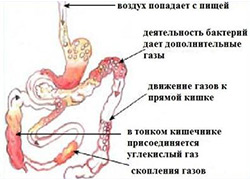 How to get rid of gases in the intestines, if no diseases and abnormalities have been identified? In this case, the specialist can prescribe both the intake of special drugs and the adjustment of the diet.
How to get rid of gases in the intestines, if no diseases and abnormalities have been identified? In this case, the specialist can prescribe both the intake of special drugs and the adjustment of the diet.
Medical therapy
The following types of drugs are prescribed:
- mezim forte, pancreatin, festal - preparations containing digestive enzymes. With their lack in the body, food particles are not digested properly, but decompose, causing the formation of a large amount of gases in the intestines for their processing;
- cholenzym, vegetarin - prescribed to improve motor skills;
- prebiotics: duphalac, hilak forte - preparations containing dietary fiber, which are an environment for the reproduction of native intestinal microflora;
- probiotics: linex, bifiform - products with a high content of live strains of microorganisms. They produce beneficial bacteria and populate the intestinal mucosa with them;
- prokinetics: motilium, motilak, ganaton - are indicated to stimulate the passage of food boluses through the esophagus. They help to reduce the activity of bacteria and the formation of gases by them;
- smecta, polyphepan - absorbents prescribed to absorb excessive amounts of gases;
- antispasmodics: no-shpa, drotaverine - are prescribed to relieve severe pain with prolonged flatulence.
Diet
 A balanced and proper diet helps to get rid of gases in the intestines - this is part of conservative therapy and the most The best way prevention of increased gas formation in the intestines. The menu should include products that not only provide a full-fledged complex of vitamins and trace elements, but also stimulate intestinal motility, reduce fermentation processes and restore its normal microflora.
A balanced and proper diet helps to get rid of gases in the intestines - this is part of conservative therapy and the most The best way prevention of increased gas formation in the intestines. The menu should include products that not only provide a full-fledged complex of vitamins and trace elements, but also stimulate intestinal motility, reduce fermentation processes and restore its normal microflora.
Basic rules for eating with flatulence:
- Frequent meals, but in small portions (200 g each) up to 5-6 times a day. This allows the body to quickly break down foods, and the intestines to absorb the necessary trace elements and remove the remaining dietary fiber, preventing their decay and fermentation.
- Excessively hot and cold foods are best avoided from the diet, as they increase the secretion of gastric juice and contribute to intestinal irritation.
- You can not eat products that are incompatible with each other: salty - sweet, food enriched with coarse vegetable fiber and milk. Such a complex increases the load on the digestive tract and provokes increased fermentation.
- All dishes are best consumed boiled, stewed, steamed or baked, in order to maximize the sparing effect on the digestive system.
- The salt content in cooked meals should be limited so as not to provoke irritation of the mucous membrane of the stomach and intestines.
- It is necessary to drink a sufficient amount of liquid: 1.5-2 liters per day (at the rate of 25 ml per 1 kg of a person's weight of clean drinking water without gas). It also prevents fermentation processes and ensures the timely removal of feces from the body.
Prohibited products
Prohibited foods include food that increases increased gas formation in the small or large intestine:
- foods containing a lot of vegetable fiber: apples, beans, beans, peas, broccoli, radishes, nuts;
- drinks and meals containing a large amount of carbohydrates (lactose, fructose, sorbitol, raffinose). Decaying in the body into small particles, they provoke the decay of food masses. These include: kvass, beer, highly carbonated flavored drinks, milk, ice cream, etc.;
- products containing in their composition substances that irritate the mucous membrane of the digestive tract and intestines: essential oils, preservatives, food additives;
- high starch vegetables: potatoes, corn, wheat.
A balanced menu for flatulence, first of all, should consist of dishes that do not stimulate increased gas formation, but normalize stools and gas discharge:
- wheat bread, wheat flour crackers;
- steamed poultry meat;
- low-fat varieties of fish;
- fresh greens;
- fermented milk products containing beneficial bifidobacteria;
- natural green tea without flavorings;
- cereals on the water: oatmeal, buckwheat, rice;
- scrambled eggs.
Folk remedies
Gases in the intestines - how to get rid of discomfort with the help of natural herbs and medicinal plants?
To relieve discomfort and pain
4 tbsp. l. red rowan berries (can be replaced with 1 tablespoon of dill seeds), 3 tbsp. l. mint and the same amount of valerian mix. 1 st. l. herbal collection pour 1 tbsp. steep boiling water and leave for at least 60 minutes, tightly covering the dishes with infusion lid. The decoction is drunk on an empty stomach, 100 ml 2 times a day 30 minutes before a meal. The course of treatment of gases in the intestines is 14 days. To relieve discomfort and pain, the decoction can be taken at the same time.
With severe bloating
 1 st. l. dry chamomile, pour 200 ml of freshly boiled water, close the lid, wrap with something warm and leave for 30 minutes. Drink 100 ml of the prepared broth twice 30 minutes before meals. The decoction can be used with a feeling of severe bloating for the purpose of prevention at the same time or drink a course of 20 days. Every day a new infusion is prepared.
1 st. l. dry chamomile, pour 200 ml of freshly boiled water, close the lid, wrap with something warm and leave for 30 minutes. Drink 100 ml of the prepared broth twice 30 minutes before meals. The decoction can be used with a feeling of severe bloating for the purpose of prevention at the same time or drink a course of 20 days. Every day a new infusion is prepared.
For the prevention of flatulence
2 cloves of garlic, 1 tbsp. l. salt, a pinch of dill (fresh or dried) and 5 leaves of black currant chop. The resulting mixture pour 1 liter of hot boiled water and leave to infuse for 24 hours in a warm place. The finished drink is drunk on an empty stomach every morning, 100 ml.
To relieve symptoms of flatulence
A small bunch of fresh parsley (can be replaced with dry or frozen) pour 0.5 tbsp. freshly boiled water, let it brew for 8 hours, strain. Ready infusion should be drunk on an empty stomach. If necessary, the decoction can be diluted with non-carbonated mineral water in a ratio of 1:3.
1 st. l. dill seeds pour 2 tbsp. steep boiling water and insist 3 hours. Ready-made broth in 4 doses is drunk during the day before meals.
Prevention
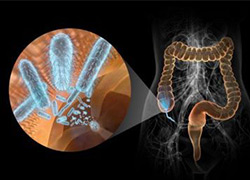 According to statistics, increased gas formation is most often found in people leading an inactive lifestyle, abusing the wrong food and bad habits.
According to statistics, increased gas formation is most often found in people leading an inactive lifestyle, abusing the wrong food and bad habits.


